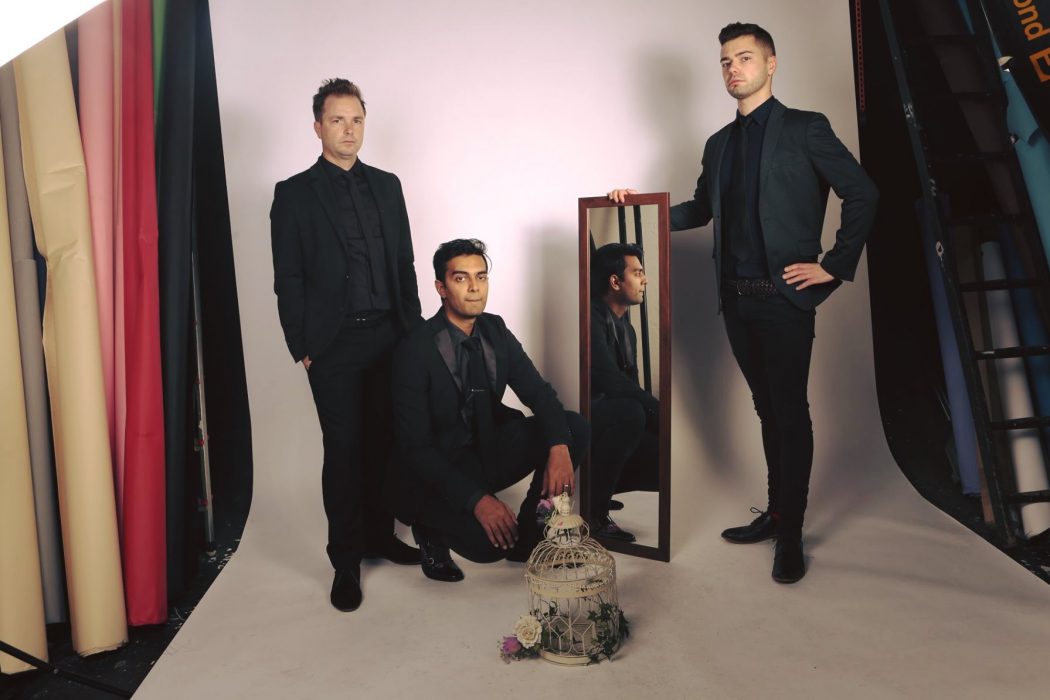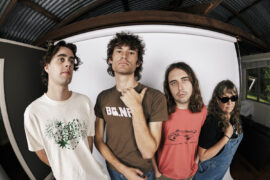The Palpitations sound like the lovechild of Protomartyr and The Stooges—with Tool and Joy Division as its close cousins on new EP ‘FEED THE POOR! EAT THE RICH!.’
— —
Maybe you know Nishant Joshi because he was the first doctor to publicly speak out about the lack of Personal Protective Equipment (PPE) in English hospitals. Or maybe you’ve seen the powerful photo of his pregnant wife protesting outside of Downing Street, a lightning rod image that captures these COVID-19-laced times the way The Migrant Mother distilled the Dust Bowl. (Joshi was hiding off-camera, on the watch for police.) Then again, maybe you know Joshi because he sought legal action against the British government over their inability to protect doctors and healthcare workers during the pandemic.
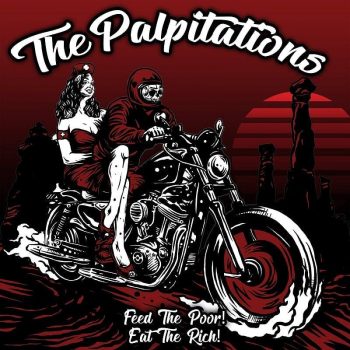
But carrying the weight of being the healthcare crisis’s public face isn’t all Joshi’s been up to. His band, The Palpitations, released their debut EP FEED THE POOR! EAT THE RICH! as Joshi rallied against his country’s government and pulled 13-hour shifts at his local emergency room. An eerie, horror-movie inspired album about isolation and fear, it was recorded in 2019— but nothing could be a better soundtrack for our current climate.
Hard-hitting, atmospheric rock that gives more with every listen, The Palpitations sound like the lovechild of Protomartyr and The Stooges—with Tool and Joy Division as its close cousins. Theirs is a sound as smooth and slinking as it is prescient and headbang-able. It may have started as a way for Joshi to decompress from long days working on the hospital floor, but don’t mistake this tight set of three songs for a hobby.
After all, Joshi only asked one question when he auditioned band members: “I want blood, sweat, and tears—which are you going to give me first?.
Stream: ‘FEED THE POOR! EAT THE RICH!’ – The Palpitations
The first email Joshi sent me held two lines that immediately stood out: The first one was the bluntly worded fact that they had to move back their release date “because we were genuinely doubtful as to whether we would survive.” In this time of staring our mortality in the face—for the first time for many of us—his statement left a heavy mark.
The second statement seemed like a throwaway line, yet was anything but: “recorded in 2019.” An EP about isolation, living in quarantine, and trying to stave off the fear of death, it’s arguably the most relevant piece of art released this year. “We wanted to create, not just music for music’s sake, that’s not what I’m interested in. I’m interested in art, and I’m interested in making what we’re doing a piece of art. I imagine somebody listening to our EP in the same way that somebody would go to an art gallery,” says Joshi—who has just got home from his fourth straight 13-hour shift —via phone.
Across FEED THE POOR! EAT THE RICH!’s nearly 12 minutes, Joshi and co. explore similar lyrical themes and draw from the same well of intense notes and haunting, atmospheric riffs, making the EP feel more like a rock opera than three separate tracks.
This was, of course, intentional: “We designed it so it would be like a trilogy of horror shorts. That’s what we wanted it to sound like,” says Joshi. “We were quite close to calling it ‘Trilogy,’ because lots of horror movies franchises are trilogies.”
His obsession with trilogies peaks with South Korean director Park Chan-Wook’s opus The Vengeance Trilogy. “South Korean horror films is probably the one genre which has really changed my life and really informed a lot of what I do—because for me, that is pure art at its highest level,” Joshi explains. “South Korean horror movies is art at its highest level, and I don’t think it can be beaten.” He comes close with the episodic structure that acts as the spine of FEED THE POOR! EAT THE RICH!, a move clearly cut from Chan-Wook and pasted onto Joshi’s own medium: Graveyard rock.
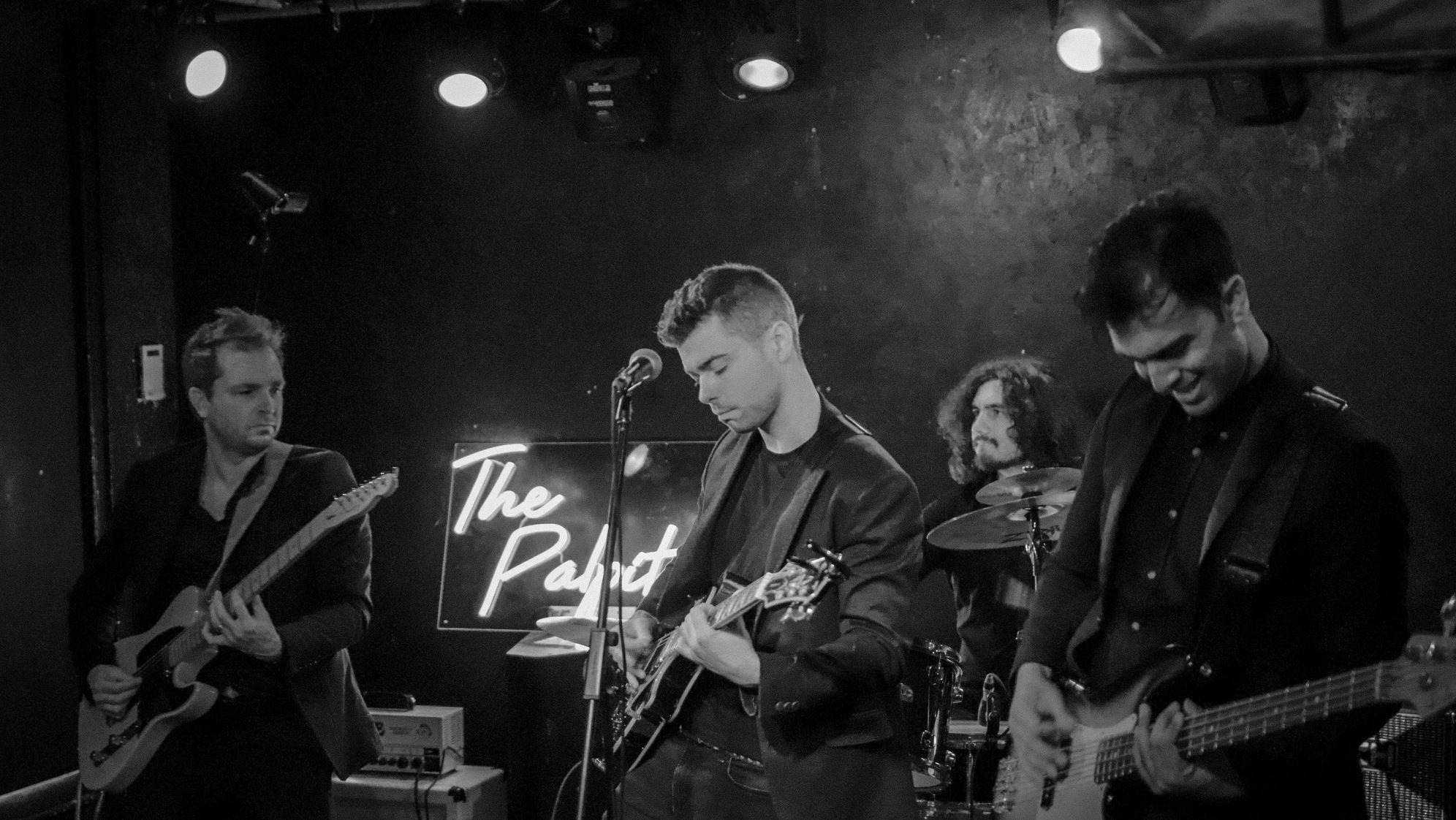
Some of the EP’s themes are instantly recognizable—fear and the universal struggle for life, for example—while others are Easter eggs waiting for your ears to uncover them. Constant references to light and dark abound, while vast open spaces where you’re easily exposed feel like a permanent setting. Slasher flick-level tension pervades every moment.
It’s an eerie experience. “Yeah, atmosphere is definitely what we’re going for,” says Joshi. The chills dancing down your arms show he delivers.
It’s also definitely an EP worth repeating, growing from an enjoyable rock album to a deeply nuanced piece on successive listens. “I don’t care about the first listen. What I want is a commitment from the listener, saying, ‘we’re going to give this a few shots’,” Joshi adds. “I want them to realize that it’s not the first listen that counts for us, it’s actually the second and the third and the fourth and the fifth, and the fiftieth.”
Opening with “My Carnivore,” you walk straight into a mid-tempo track that draws out notes and really emphasizes the Morrissey-like delivery of lead singer—and fellow emergency room doctor—Tom Talbot. The pounding, constant drumbeat serves as a forbearing of what to come. Without noticing, your heartbeat soon matches it.
Desert swallows the sun;
But the darkness will not come
I pray for night to fall,
Pain rests eternal.
Vultures keep me company;
Sand soaks up my grief,
I am caveman.
I live as my own thief
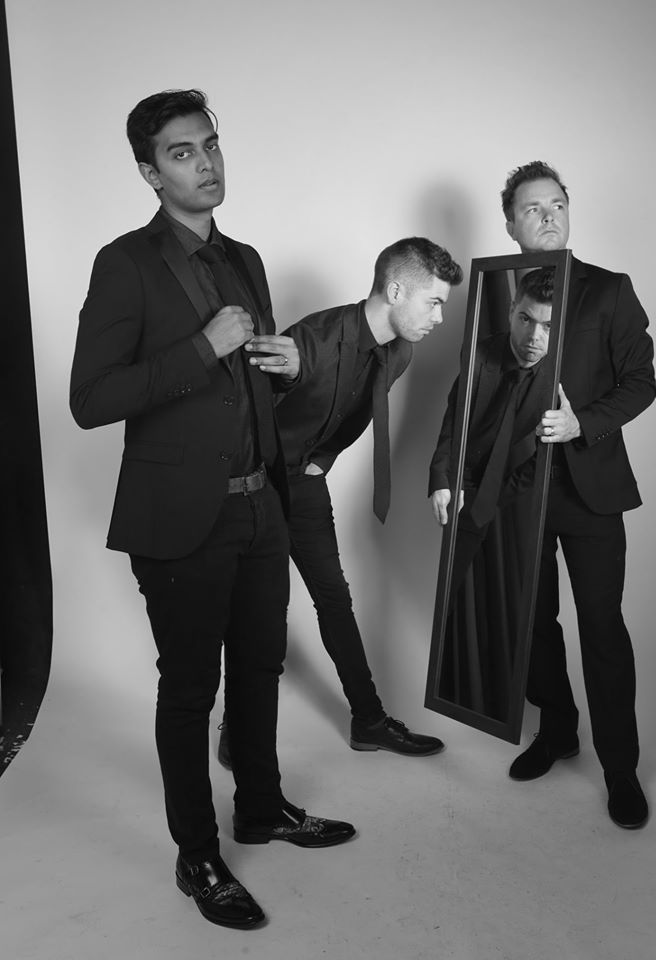
This slowly melts into “Lights Out,” a rousing track that quickens the tempo and gets the head banging. “‘Lights Out,’ will probably be our poppiest ever song, but it’s really subversive in the way that the lyrics are really sinister and it’s about something really sinister,” says Joshi. “But I want the people to be able to dance along to it in a kind of blissful ignorance without knowing what the song’s really about. For me, that’s what’s really beautiful about it.”
When distance numbs my soul
I turn the lights down low
So I can forget
Our instant ecstasy
My constant regret
So maybe I’ll stay for a while
In the vague hope you’ll feel tactile
We’ll watch The Birds,
Baby with the lights out, lights out
Closing out the trilogy is “Siren,” which is a beautiful bow on this constantly giving gift. With guitars swirling hypnotically—like its namesake siren, perhaps—the lyrics evoke the word’s double meaning through framings of lust and danger.
“It starts off as a song about addiction, and the descent into addiction. Just as a sailor can be led to his death by a siren, we’re all suffering from addictions—whether they’re micro addictions like checking Twitter 100,000 times a day, or whether it’s actual literal drugs or whether it’s sipping on an old fashioned at the end of every shift, then slowly, realizing that you’ve descended into alcoholism,” Joshi says. While addiction is something Joshi sees in his daily work, he sees it as a larger statement: “It holds up a mirror to society; how we treat our addicts is how we are as a society, really.”

The trilogy’s crescendo comes at “Siren’”s final bridge, where the pounding bassline and screeching guitar fight for attention. Listen closely, however, and you’ll find something more: A stunning spoken piece about morality.
It is as inhuman to be totally good as it is to be totally evil.
The important thing is moral choice.
Evil has to exist along with good, in order that moral choice may operate.
Life is sustained by the grinding opposition of moral entities
Taken as a whole, the songs call and answer to each other. Where “My Carnivore” croons “Wrap me limb from limb, so I can breathe you in,” “Siren” answers with the sickly sweet smell of rot: “Lust will reel you in, Suck the air out of your lungs.”
These call-and-responses tumble along arm-in-arm, circling in on the whole album. They watch you listen after listen, waiting for you to see them, too.
Most interestingly, however, is the way this sense of doom is captured. “I try and always hold a guitar when I’m watching a horror movie. And the strums that I play along to when I’m watching a horror movie just sets the mood. And that’s really, really important,” says Joshi. “I’ll try and write down any lyrics. So any important bits of dialogue or something that I find really interesting or creepy. Sometimes I’ll pause the film and just take a photo and then I’ll use that as inspiration.”
“When I start writing a song, I start off from that sort of base and that feeling of fear that I have,” Joshi explains, shrugging off in a single sentence the nail-biting vibe The Palpitations has perfected. Since the state of the world today probably has you tensing your shoulders anyway, what could be a better soundtrack?
Once these Slasher-inspired demos are brought to the band, they’re placed through each member’s influence-wringer, creating a distinctly Palpitations sound. “We all come from really different [musical] backgrounds. I think the only strong overlap we have in our band in terms of musical tastes is both Brett and Tom love Tool,” says Joshi with a laugh. Artists as varied as Opeth and Danny Brown are sprinkled into the Palpitations sound, making it so uniquely their own.

FEED THE POOR! EAT THE RICH! is Joshi’s espresso shot to wake up the masses to the wrongs of our leaders: “They are pathologically disconnected from grief, and I’m gonna make sure that they become reconnected with it,” he says. Joshi talks at length about his own activism—be it his own class action lawsuit or his organizing during the Black Lives Matter protests. As the primary lyricist of the band, these ideas indirectly permeate the record, seething on your skin as goosebumps do.
When it came time to title the band’s EP, “We couldn’t really come up with a name for the EP for quite a while,” Joshi recalls. “And then I came across this quote from a French philosopher [Jean Jacques Rousseau], which said, ‘when the poor have nothing left to eat, they will eat the rich.’ And I was like ‘that sums up exactly how I’m feeling right now.’ I actually want to be a cannibal, only for rich people,” he says with a laugh.
FEED THE POOR! EAT THE RICH! is the soundtrack of 2020. It captures not only the fears of living through a pandemic but also the struggles of making rent and staying fed in a post-capitalist world. It gives legs and a bassline to the anxiety in your heart, reminding you that you feel this way for a reason. Its haunting tones were made to be listened to with your mask drawn tight and your friends at a safe, six-foot distance. It’s also a challenge to embrace the fear of our times and turn it into something good. Are you listening?
— —
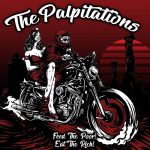
Connect to The Palpitations on
Facebook, Twitter, Instagram
Discover new music on Atwood Magazine
? © 2019
:: Stream The Palpitations ::

